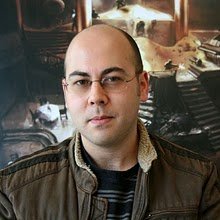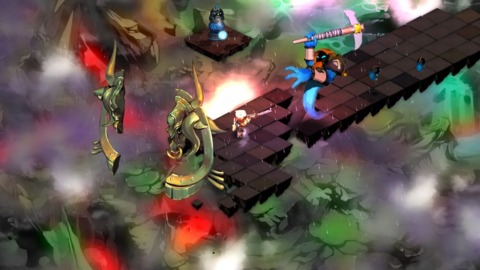Kasavin parses press, publisher, developer relations
PAX 2010: Former GameSpot editor-in-chief, Red Alert 3 producer, and 2K Games publishing producer talks about the interaction between the three game-industry factions.
Who was there: Former GameSpot editor-in-chief, EALA line producer, 2K Games publishing producer, and current Supergiant Games creative director Greg Kasavin.
What he talked about: Greg Kasavin gets around. GameSpot's onetime editorial leader, Kasavin left the games journalism beat after 10 years in 2007 to join Electronic Arts' LA studio, first ushering Command & Conquer 3: Tiberium Wars to the finish line and then contributing to C&C: Red Alert 3's development. With EALA's operations in flux following Red Alert 3's lukewarm reviews, Kasavin left the publisher in 2009 to join 2K Games' publishing arm, overseeing teams that included Yager's Spec Ops: The Line.
Just this week, Kasavin moved on to his new role at startup Supergiant Games, which is developing the action role-playing game Bastion. Nonetheless, he took the time to take the 2010 Penny Arcade Expo stage and recount his experiences in a session titled "Memoirs of a Triple Agent." After a brief rundown of his various roles in the game industry up to this point, Kasavin kicked off his talk by noting that there exists a substantial amount of misconception and animosity between the fields of game journalism, development, and publishing that he'd like to shed light on and hopefully dispel.

Kasavin noted that the game journalism field is often chaotic and intense, and throughout the course of his career at GameSpot, he never quite felt like he had things under control. Offering a quick tutorial on how to break into the games press, he said that working for free by playing games, writing up or filming impressions, and building an audience is the best way to gain the attention of the various outlets.
He also hit upon a theme that stretched throughout his presentation, the idea that the best way to achieve success is by cultivating a reputation of transparency and accountability while exhibiting an intense work ethic. He also noted that it isn't a particularly good idea to simply drop whatever else is going on in life to launch a gaming journalism career, saying, "If you can't juggle the work, then you're probably not a good fit."
As for industry relations, Kasavin said that the press and developers are often on the best of terms between the three factions. This is because of the admiration that the press often feels for the people who make their favorite games, and the appreciation developers have for the attention they get from people who write about their games.
However, this bond can be a cause for concern, he said, due to the possibility for a conflict of interest that exists. Kasavin said that he intentionally segmented himself off from the development community while at GameSpot, because it is much more difficult to give an honest assessment of a game when the writer is friends with the developer. He noted that the press's first responsibility is to its audience, not the development community. Ultimately, this is the best tack to pursue, he said, because the audience will appreciate the press's coverage more, while the development community will respect the principles behind it.
Of course, making friends isn't exactly an easy task for the press, because publishers work diligently to restrict writers' access to those who actually make the games. The motivation behind this mentality, Kasavin said, is that publishers often fear what a developer may say that could reflect poorly or be twisted in such a way to reflect poorly on the game in question.

Publishers, he noted, have a love-hate relationship with the press. "They will love you when you give their games 9s and 10s, but in general, the interaction is very tense," he said, emphasizing that publishers often only see this as a business. And because the press's critical opinion can lead to diminished sales, publishers are under a good deal of pressure to manipulate critics into giving the best scores to games.
For the press, the way to approach publisher relations is through a "gentle but firm" attitude, while also standing in a defensible position. It also helps to understand that a publisher's PR department is often under a good deal of stress, as they are often seen as the reason that a game is given high or low marks, regardless of the actual quality of the game.
Kasavin's talk then shifted to his experience working on the development side of things for EALA. He noted that the development scene has long since left its humble beginnings of small teams and small budgets, but the industry as it operates now lacks balance. "People are crunching themselves to death," he said, referencing long work hours without reprieve. He also bemoaned the fact that development teams are getting quite large, and it is very difficult to control the interaction of people on that scale.
But for those who want to break in to game development, he again returned to the concept of initially doing the work for free, taking a game engine such as Unreal or Starcraft II's level editor and simply making levels. He said that building mods and the like is the best way to circumvent the catch-22 scenario of needing experience to land a job in the industry, but needing a job in the industry to get that experience.
"Start doing the work on your own time, and it might work out in the future," he said.
He also noted that the development community often has an antagonistic relationship with the publishing side of the business, a situation that was brought into sharp focus withActivision's Infinity Ward fiasco earlier this year. One reason for this is publishers' decision to enact sweeping layoffs following the completion of a game, a situation that has been all too familiar this summer.
Another reason is the meddlesome nature that many publishers exhibit toward their creative talent. Because development is done on the publisher's dime, they are risk-averse. Also, the importance of every game being a hit means that publishers must spend substantial amounts on marketing. So if a developer asks for more time to increase the quality of a game, a publisher must balance the money it has already spent on hyping the game's release versus the additional time it will remain in development.
Because he spent only about a year on the publishing side, Kasavin offered only a superficial account of his experience at 2K Games. The difference between being a producer on a development level and a producer on a publishing level, he said, is that the publishing side is often overseeing multiple projects at once. He offered a military analogy to illustrate the ideal publishing producer, saying that they best operate as a chopper hovering over a battalion of troops, offering support when needed but largely staying out of the way.
Kasavin closed his presentation by listing the five rules that he has followed and that have helped define his career. First, it is important to empathize with people, and understand why they do what they do. Second, "give a damn" about the results, a point he called the most important. Third, be like Charlie Brown, which is to say, don't act like a hotshot. No one knows everything, and it's important to keep learning.
His fourth and fifth rules, he conceded, are somewhat paradoxical. "Go work, then go home, and then work," he said, saying that becoming a workaholic is an excellent route to accomplishing goals. On the flip side, he said that it is important to make time to not work, whether that be through exploring another medium such as books or movies, or simply taking a walk.
Quote: "Bastion isn't the first game I've poured my heart into, but it's the first game that you'll be able to tell."
Takeaway: Kasavin's extreme work ethic notwithstanding, the secret to his success within the three factions of the games industry has been fueled by a focus on integrity and a devotion to the medium.
Got a news tip or want to contact us directly? Email news@gamespot.com
Join the conversation